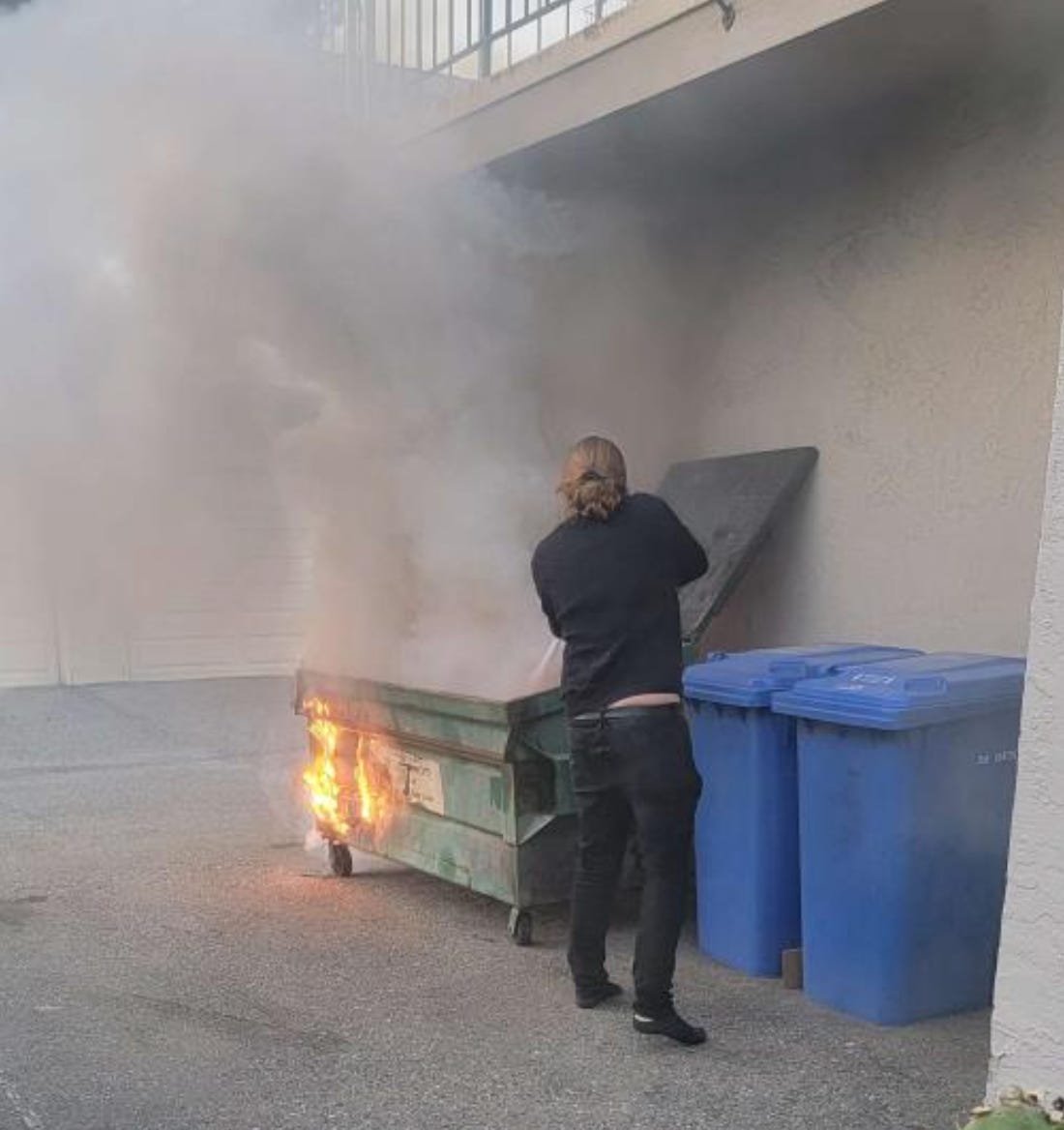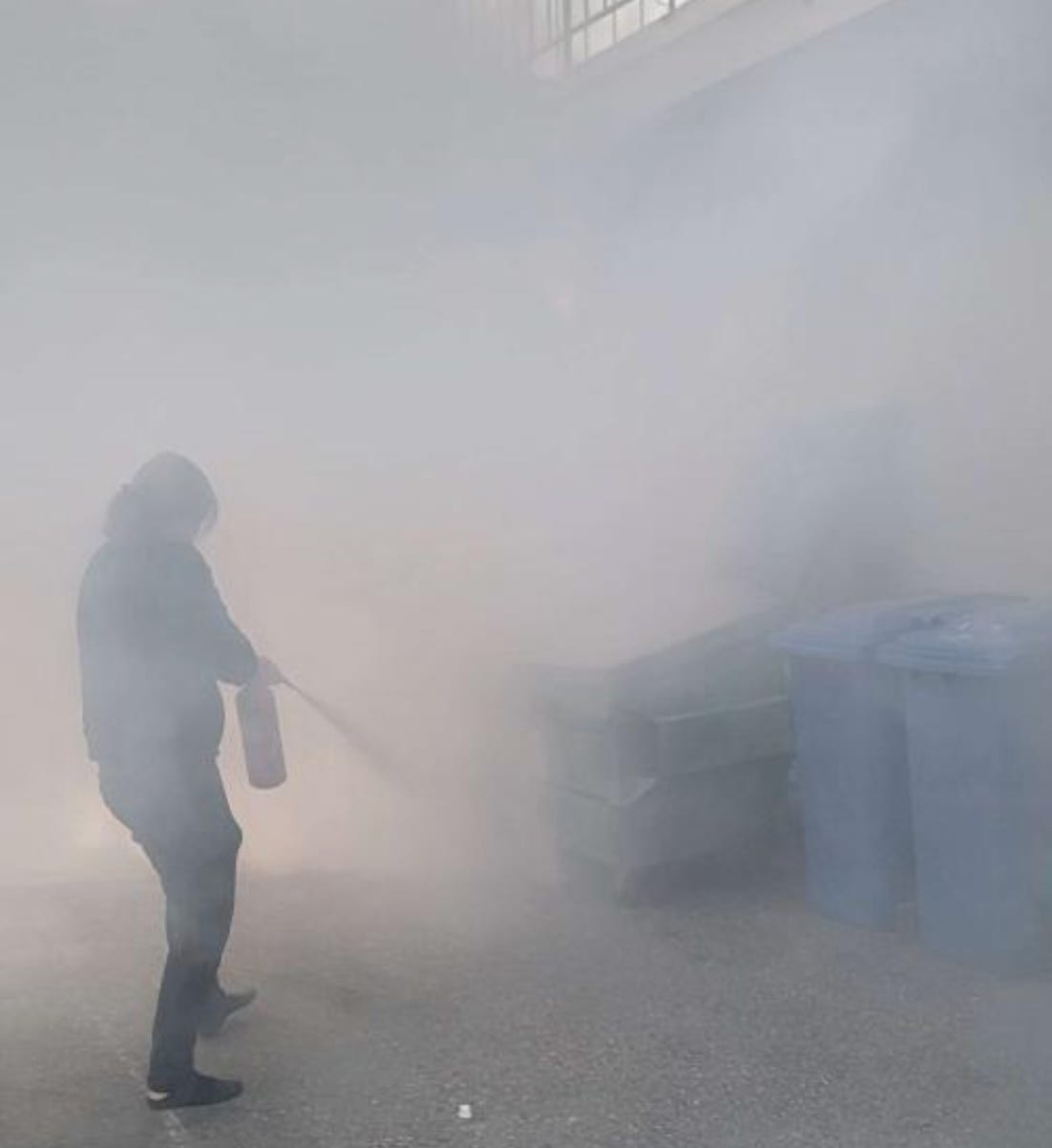Memorial Day Dumpster Fire, Literally
Disaster unveils the uplifting truth: basic human nature is prosocial and anarchic.
My Memorial Day weekend was marked by a dumpster fire.
A real one, not a metaphor.
Given it’s a grilling holiday, we tried for thirty minutes or so to convince ourselves that the acrid burning smell wafting into our open windows was just someone’s barbeque. It didn’t smell at all appetizing, but maybe that was just charcoal. Maybe it was the accelerant they used to get the fire started. Maybe the grill was dirty from disuse or something.
Eventually, I couldn’t keep persuading myself to postpone an investigation.
Out the front door of our house, the smoke smell was stronger. To the left, a tow truck was picking up a car from the commercial lot next door. For a split second, I reasoned the smell might be an overheated engine or an oil leak. My nose tugged me to turn around though, so I looked right.
The whole street was visibly thick with a lens of grayish clouds.
I continued to sniff the air and took the dozen steps around my house to the alley that leads to the back of my little quadruplex. The smoke was thicker still the second I turned the corner.
Roughly halfway down the path, I saw the source. Six feet of vibrant flames raging and crackling from our dumpster. They were just beginning to occasionally reach up and tickle the overhang of my neighbor’s balcony. I barely glimpsed it before muttering “ah fuck!” and jogging back to my house.
Swinging the door open, I said, “Told ya it was smoke. Our dumpster is on fire.” I found my phone. Dialed 911.
When the crisis passed, my daughter teased me mercilessly for the calm way I announced the fire.
“Um, yeah, I just thought you should know: our dumpster is slightly on fire,” she repeated over and over, poking me, totally deadpan.
That’s how I get in a crisis, I guess. Emotionally detached. Dissociative perhaps.
I often feel bad that my wife handles all our scheduled responsibilities. When I’m telling a friend about how my day job direct deposit goes directly to her so she can handle bills and dole out my allowance, sometimes self-esteem is difficult to access. Our marital arrangement occasionally makes me feel like a manbaby being mommied by the mother of his child.
But if she handles carefully composing our life like classical music, I take care of the situations that call for jazz. She may be able to balance the orchestra of everything asking adulting of us, but when the plans go awry and someone needs to jam out with an improvisational flow to figure a path through disaster, that’s my time to shine.
The point is, there’s more than one kind of job that needs doing and, conveniently, more than one kind of person in the world who is willing to help out.
From this picture, you might get the mistaken impression that I acted as the classical action movie protagonist: cosplaying as “masculine” and independent, solving the crisis solo. Flexing on the terrorists. Punching the hurricane in the jaw.
What you don’t see in this picture, which was taken as documentation for our landlord, is that my wife was the one who got out the extinguisher in the first place. I insisted on being the one to use it because she’s healing from a knee injury, but I had to insist vehemently.
What you don’t see is the people running in every direction in the background. Rebecca Solnit talks about this in A Paradise Built in Hell, the number one book you need to read if you’re worried about the apocalypse. In movies, we often see the extras running everywhere looking scared and confused. That happens in reality too, Solnit observes, but it’s not orderless chaos.
When the shit hits the fan, people self-select into useful jobs they don’t see anyone else doing and everyone pulls their weight.
In the background of this picture, one of my neighbors is flagging down the firefighters and sending them into our hard-to-find alley. In the background, getting none of the credit they deserve, there are people knocking on the doors of the eight homes that could possibly be affected. There are moms comforting their sobbing children a safe distance away from the building. There are neighbors gathering buckets of water—which came in handy later.
During my first attempt with the extinguisher, the smoke got so bad I couldn’t breathe well enough to put out the fire fully. I left telling my neighbor that I was positive it would catch again.
I grabbed an N95 from my house, and in the time it took me to find it, a man I had never seen before had somehow used his heavy jacket as an oven mitt and pulled the once-again-flaming dumpster away from anything that might catch fire.
I am fairly convinced that man was the tow-truck driver I mentioned earlier. Zero investment in the outcome, and yet he braved that horrible-smelling smoke and the scalding metal to help save our homes.
I went to bed with a sore throat and an ugly cough; I can’t imagine how bad it was for that mysterious stranger.
And that is human nature.
If you look around—at the culture wars, at politics, at -isms and -phobias of every variety—what you see probably looks a little like a dumpster fire.
But the message of A Paradise Built in Hell—which, again, you have to read—is that when push comes to shove, we have each other’s backs. In the event of Civil War or Climate Apocalypse or AI Uprising or whatever form of climactic Judgment you personally subscribe to, we will work together. We will, ultimately, overcome.
There were no leaders running the show from the top down in this particular dumpster fire. It was anarchy.
We were better off for it.
Solnit demonstrates that leaders tend to make choices that protect property over lives. How often have we watched the police or National Guard gun down civilians requisitioning needed supplies that will save lives while excusing the murder of these otherish helpers by calling them rioters and looters?
As Mr. Rogers’ mom said, “Look for the helpers.” There are always helpers. I can’t think about that without getting teary eyed.
This dumpster fire microcosm of crisis response was proof that when the register embedded in society’s hierarchies, media, infrastructure, architectural choices and technological UX falls away in the face of something more urgent, our basic instinct is to take care of each other.
Our basic nature is prosocial. Egalitarian and anarchic.
We can overcome whatever dumpster fire the universe throws at us.





In times of alarm or proximate, local emergency, most humans instinctively band together like tribe and family. It's seems so natural. Getting this type of instinctual assistance, risk-taking, and support to scale out beyond neighborhood and community - to address less immediate, wider concerns and issues - is how and why politics and government was born.
As alarming as this account was, being involved in community action and response like you describe here is when I feel happiest and most fulfilled in my human being.